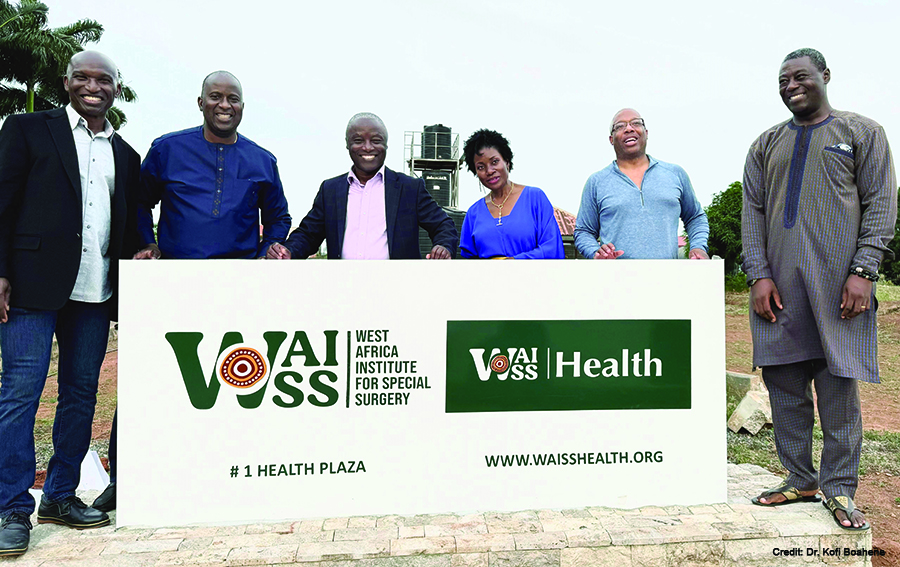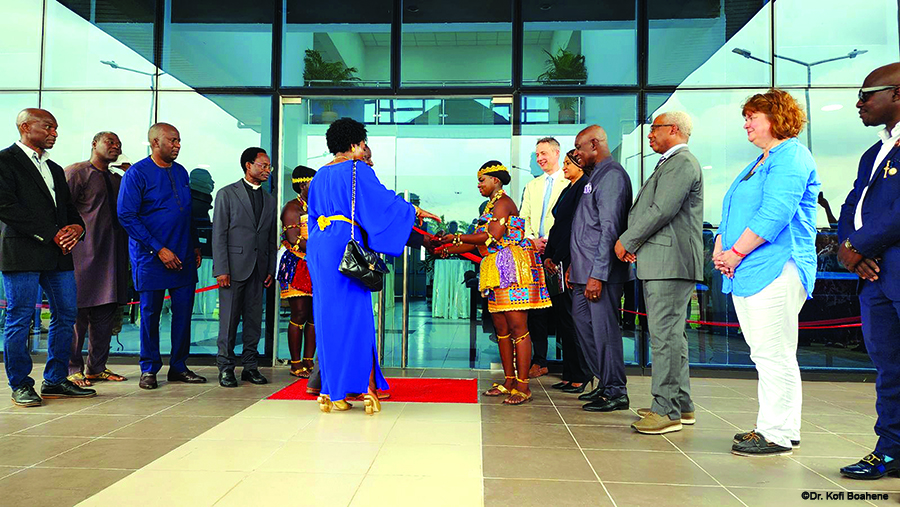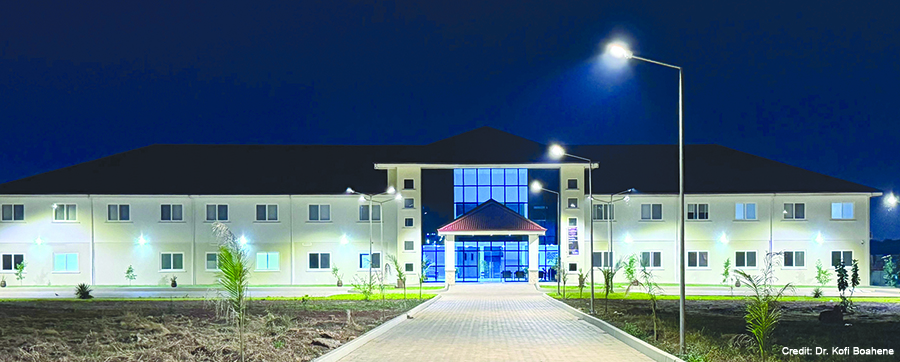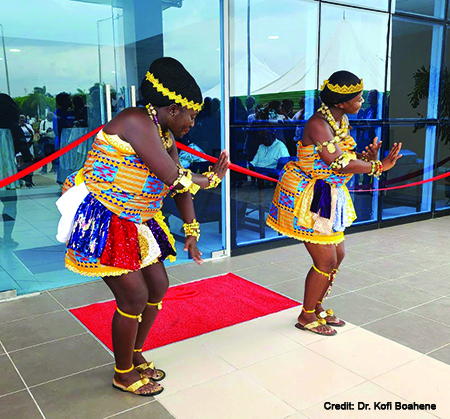The West Africa Institute for Special Surgery (WAISS) opened its doors in March 2024, marking a significant milestone in the effort to enhance medical care in Africa.
Shortly after its opening, the hospital received a call from an individual with kidney cancer—the “type of kidney cancer where, if they have the means, they get on a plane, fly to India, the U.S., or Germany, and get surgery,” said Kofi Boahene, MD, co-founder of WAISS, professor of otolaryngology–head and neck surgery and dermatology, and director of the division of facial plastics and reconstructive surgery at the Johns Hopkins University School of Medicine in Baltimore.
The afflicted individual asked, “Can you do this surgery?” The answer was yes. Specialty surgeons performed the complex, minimally invasive surgery at the new, 46-bed surgical hospital in Accra, Ghana, and the patient went home two days later.
It was an historic event. The successful surgery was the first one performed at WAISS and the first surgery of its kind completed in Ghana.

FSS Board members celebrate the opening of the West Africa Institute for Special Surgery (WAISS). From L to R: Dr. Joseph Akunnor, Dr. Ifepo Sofola, Dr. Kofi Boahene, Mrs. Pamela Sofola, Dr. Anthony Brissett, and Mr. Anthony Boateng.
“When people heard that the surgery was done, they didn’t believe it. They said, ‘Nobody does that surgery in this country,’” Dr. Boahene said. “But this is why we wanted to do what we have done. So, it is possible.”
According to a 2015 report by the Lancet Commission on Global Surgery, approximately five billion people do not have access to safe, affordable surgical and anesthesia care when needed (Lancet. 2015;386:569-624). Despite strides in recent years, access remains far below demand in many parts of the world. The Lancet Commission recommends 5,000 surgical procedures per 100,000 as a target to meet population surgical needs, but the current surgical volume rate in Ghana is just 869 surgical procedures per 100,000 population (Glob Health Action. 2022;15:2104301).
WAISS is the latest step in an ambitious plan born of the efforts of two otolaryngologists. Dr. Boahene and Ifepo Sofola, MD, a facial plastic surgeon in private practice in Washington, D.C., are determined to increase access to specialty surgery around the globe. To do so, they know they’ll have to increase local capacity, and to achieve that goal, they must build sophisticated hospitals and attract top-notch surgeons to train the next generation of healthcare providers. They’ve spent the better part of two decades working toward that goal and don’t plan to stop anytime soon.
African Roots
Drs. Boahene and Sofola met as fellows at a national academy meeting in the early 2000s. They couldn’t help but notice one another.
“Back then, there were not too many Africans or even African Americans in ENT, much less facial plastics,” said Dr. Sofola, who was born in the U.S. and grew up in Nigeria. He and Dr. Boahene, a native of Ghana, bonded over their shared heritage and similar experiences.
Flying into these various countries and performing surgery just wasn’t providing a lasting solution to the problems of subspecialty care on the continent.” —Ifepo Sofola, MD
The two men stayed in touch. Both had a deep desire to improve medical access in West Africa, and both participated, separately, in medical missions around the world. Eventually, they started doing medical missions together.
“I think the first mission I did with him was to Nigeria,” said Dr. Boahene. “And then we did missions to Rwanda.”
During these mission trips, they repaired complex facial defects with the help of other physicians and healthcare providers from the U.S. and Europe. They transformed patients’ lives but realized the need was far greater than periodic mission trips could meet.
“Flying into these various countries and performing surgery just wasn’t providing a lasting solution to the problems of subspecialty care on the continent,” Dr. Sofola said, noting that many sub-Saharan African nations lack robust infrastructure for healthcare. African doctors who want to pursue specialized training usually must leave and study elsewhere due to the “dearth of expertise on the continent,” he said. By the time they complete their training, many have families and are reluctant to uproot them to return to Africa.
“We were not making a sustainable impact,” Dr. Boahene said of their mission trips. “We always knew that at some point, to take that next leap, we needed a place where we could influence how local physicians are trained.”
The two men dreamed of eventually opening a hospital in Africa—a hospital that would also train local physicians to perform complex specialty surgeries and teach local healthcare providers how to manage the pre- and post-operative care of medically complex patients.
Teaming Up to Turn a Dream into Reality
Dr. Boahene had started sharing this dream in the early 2000s while undergoing surgical training at the Mayo Clinic. There, he met Anthony Brissett, MD, a Canadian American citizen born in Jamaica, and Holger Gassner, MD, a German physician who came to the U.S. to study facial plastics. Both men encouraged his ambition and pledged their support.

Drs. Boahene and Sofola played to their strengths to bring their goal of building a hospital where complex surgeries could be done and local physicians could be trained.
By 2008, Dr. Boahene was making a name for himself at Johns Hopkins and in the wider world of facial plastic and reconstructive surgery. Dr. Sofola was finishing his service with the U.S. Navy and considering his next steps after completing his tenure as the chief of the division of facial plastic and reconstructive surgery at the National Naval Medical Center in Bethesda, Md. Both men were committed to transforming healthcare in Africa and beyond; both wanted to make it possible for African doctors to provide necessary, complex care locally.
Together, they devised a plan.
“We collectively decided that Kofi would stay at Johns Hopkins and become world famous. And I would go to Houston, where I became involved in the construction and management of three physician-owned hospitals,” Dr. Sofola said.
The team knew they’d need lots of money and lots of support to build and staff a hospital in Africa, so Dr. Boahene continued his work at Johns Hopkins, eventually attracting international renown for his ground-breaking work in facial reanimation surgery, his innovations in minimally invasive surgical techniques, and his medical missions to Africa and elsewhere. Dr. Sofola learned the business of medicine from the ground up, navigating local politics, overseeing construction, and managing fiscal operations. He also continued to participate in medical missions whenever possible.

Drs. Sofola and Boahene met as fellows at a national academy meeting in the early 2000s, and this year they realized their dream by opening an 87,000-square-foot hospital in Ghana.
In 2013, CNN highlighted Dr. Boahene as “the doctor who rebuilds faces,” emphasizing both his expertise and his path from Ghana to medical school. In the CNN piece, Dr. Boahene pointedly expressed his desire to pave paths for others.
“There are a lot of children in Africa, just like me, probably more talented, looking for opportunities,” he said. “I got one … I have to carry that back to the continent, the things that I’ve learned.”
He drew additional attention to the problem of African “brain drain” in a 2013 op-ed published by CNN in which he noted that, in the year 2000, “one-fifth of all African-born physicians and one-tenth of all African-born nurses were working overseas.” He also elucidated the importance of moving beyond medical missions to sustainable investment in African infrastructure and used the success of Mayo Clinic to illustrate this vision.
“Having trained at the Mayo Clinic in Rochester, Minn., I am keenly aware of how a small group practice can evolve beyond one generation into a world-renowned medical center,” Dr. Boahene wrote. “The Mayo Clinic developed gradually from the medical practice of a father and his two sons. Resources, skill sets, and expertise should be pooled to establish viable private medical institutions that can survive their founders and expand beyond
one generation.”
Dr. Sofola was content to labor in the background, fulfilling his commitment to learn about building hospitals. Both men knew that they could accomplish more together than individually—just as in NBA basketball.
“In the NBA, you have Michael Jordan and LeBron James,” Dr. Sofola said. “Michael Jordan is Dr. Kofi. We recognize that if we support, rather than compete with Michael Jordan, with LeBron James, we’ll get farther. Maybe I’m the Dennis Rodman, the crazy one that grabs rebounds, the one doing the dirty work. Or I’m the one talking to the press and making everyone laugh. You find your role and do whatever you can to support each other. Then you will get your end result. We don’t compete with one another; we work together.”
Having trained at the Mayo Clinic in Rochester, Minn., I am keenly aware of how a small group practice can evolve beyond one generation into a world-renowned medical center.” —Kofi Boahene, MD
WAISS opened in March 2024, slightly less than three years after its 2021 ground-breaking ceremony. But that milestone was the result of decades of dedicated effort.
“There’s an African saying, ‘If you want to build a mountain tomorrow, start gathering stones today,’” Dr. Boahene said. “We always knew that building a hospital is not an easy task. So ‘gathering stones today’ was first talking to people and trying to get them engaged.”
Through their professional networks and participation in medical mission trips. Drs. Boahene and Sofola recruited dozens of supportive physicians. They also learned much about the challenges of performing complicated surgeries in under-resourced areas.
“The more I got involved, the more I realized that it was going to be necessary to form a foundation to do what we wanted to do,” Dr. Boahene said, noting that most medical missions focus on simple surgeries, like cleft lip or palate repair. He and Dr. Sofola wanted to give people access to medically complex surgeries.
To support that goal, he created the Foundation for Special Surgery (FSS), a nonprofit humanitarian group that was officially registered in 2014. Dr. Sofola serves as trustee; Pamela Sofola, Dr. Sofola’s wife, a certified public accountant who previously worked for the World Bank, serves as director of development. Dr. Gassner and Dr. Brissett, Dr. Boahene’s former Mayo colleagues, also both serve on the board and have worked tirelessly to raise funds and obtain the necessary equipment. The team is packed with dedicated professionals who volunteer their time—including Dr. Boahene’s seven siblings.
From about 2013 until the COVID-19 pandemic interrupted international travel, the FSS conducted medical mission trips to Rwanda. During—and in between—these trips, physicians focused on building local competence as well.
“When we first started going to Rwanda, you could see the aftereffects of the civil war of preceding years. They didn’t have any infrastructure, barely any doctors left, any sophisticated surgeons,” Dr. Boahene said. “And from nothing, we helped with taking care of patients and training, to the point that now Rwanda really doesn’t need us there anymore.”
The success achieved in Rwanda offered clear evidence that their approach of supporting and educating local doctors could indeed meaningfully improve access to care in previously underserved areas.
“We demonstrated that we can actually transfer skills, elevate the level of competence of ancillary staff and surgeons,” Dr. Sofola said. “We also saw the local benefits of that improvement in care, which was a testament to the viability of our charge.”
Building a Hospital in Ghana
Dr. Boahene began searching for a suitable site for a hospital in the mid-2010s. The FSS team agreed that Ghana was the right place, so Dr. Boahene headed the search.
“I wanted to find a place where there was an existing hospital with a vision similar to ours—not just to take care of patients but to train also. I also wanted something that had a U.S. or European model of care,” he said.
At the time, there were two possibilities: a hospital built by a New York-trained surgeon that had become a world-class center for spinal surgery and an oncology hospital built by a Swedish group. Dr. Boahene spoke with representatives of both groups, hoping to secure a deal to purchase nearby land. Both groups agreed at different times. Then, both backed out. Dr. Boahene resumed his search. Eventually, the orthopedic hospital agreed to sell a portion of its land. FSS purchased it, and Dr. Gassner found an architectural team to draw up blueprints, pro bono. The next years were spent reviewing plans, fundraising, overseeing construction, and procuring surgical instruments and medical equipment for the hospital.
“I have replaced all my dark hair with grey hair since we started,” Dr. Boahene said. “Building a hospital in Ghana—building there in general—is a challenge. Building a hospital to the standards we are used to in the U.S. is a whole new level of challenge.”
The new 87,000-square-foot hospital is adjacent to the FOCOS Orthopedic Hospital in Accra, Ghana’s capital. Thanks to the expertise of world-class volunteer surgeons and nurses, WAISS currently offers minimally invasive urologic surgeries, head and neck cancer surgery, minimally invasive skull base surgery, microvascular reconstruction, craniofacial surgery, and more. These professionals will work alongside local healthcare providers, passing along their expertise.
“The facility is world-class. We believe that we will be able to train the next generation to the highest level of competence,” Dr. Sofola said.
He and Dr. Boahene are not yet done, however. They envision WAISS as a flagship facility akin, in some ways, to the Mayo Clinic Hospital in Minnesota. Just as Mayo now has satellite hospitals in other states, which attract patients who need high-level care, Drs. Sofola and Boahene expect WAISS to be the standard setter.
“We anticipate that we’re going to build more facilities in all corners of the continent,” Dr. Sofola said. “Our hope is that patients can receive the highest level of care, in a culturally sensitive environment, close to home.”
Jennifer Fink is a freelance medical writer based in Wisconsin.


